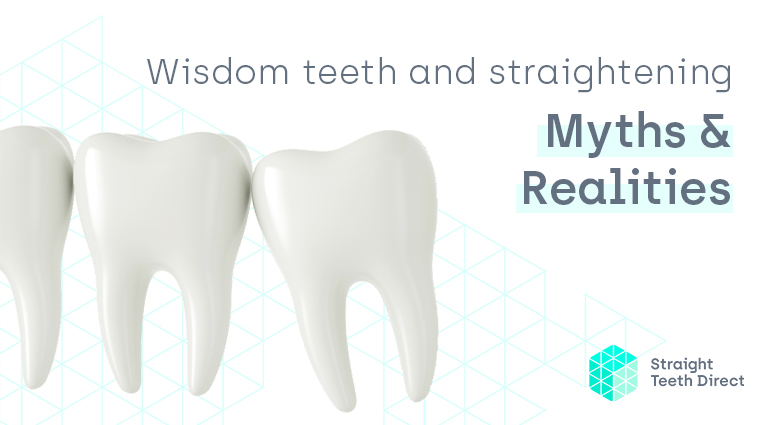
Wisdom teeth and straightening – myths and realities

You may be wondering what to do with your wisdom teeth before getting started with braces or clear aligners. You may also want to know whether they could cause an issue if they appeared part way through or after your treatment.
In this blog we’ve answered all common questions about wisdom teeth before in relations to orthodontic treatment as well as clear out some myths around wisdom teeth.
#1 What are wisdom teeth?
Wisdom teeth, also known as 3rd molars, are the back teeth that grow right at the back of your jaw. They don’t serve any useful functional purpose as they aren’t relied upon for eating. In many adults they are missing entirely, in others they never come through fully.
So they aren’t helpful, but can they be harmful?
5 wisdom teeth scenarios:
- They came up into position perfectly
- They came into position more or less correctly with a gum flap covering it
- They are coming through at an angle / there isn’t space for them to come out
- They are hidden below the surface.
- There are no wisdom teeth.
The first thing to realise is just because you have wisdom teeth doesn’t mean they must be removed. The goal of any surgical procedure is to create a benefit for the patient to solve a problem and improve their health. In the UK the NICE (National Institute Of Clinical Excellence) did some research and published guidance that says: “Removal of pathology-free impacted third molars should be discontinued in the NHS” and “Surgical removal of impacted third molars should be limited to patients with evidence of pathology.”
#2 When should wisdom teeth be removed?
Wisdom teeth used to be removed to prevent orthodontic crowding as a preventive measure as it was thought they played a significant role in this. Modern evidence has shown this to be untrue. Having wisdom teeth removed is not something that should be considered lightly, so if there is no health condition requiring removal (see list below) then the wisdom tooth should just be monitored in regular dental checkups.



If any of the 4 items above aren’t correct then you don’t need the wisdom teeth removed, and even then if a wisdom tooth needs to be removed due to pain on biting (e.g. The upper wisdom tooth keeps biting the lower and making the gum inflamed, then the upper wisdom tooth would be removed not the lower.
Despite this knowledge unfortunately many clinicians still recommend the removal of wisdom teeth. Having them removed privately under sedation can be quite expensive ranging from €300 to €800.
#3 Wisdom teeth and teeth straightening
Can wisdom teeth affect teeth straightening?
No. It’s perfectly fine to straighten teeth when wisdom teeth are present or even moving into position. The wisdom teeth even when moving exert a tiny force which cannot change / affect your teeth straightening treatment. This is because any brace to improve your smile acts on the teeth visible in your smile which are typically the front 10-12 teeth. Wisdom teeth play no positive role in achieving orthodontic outcomes.
Can wisdom teeth make my teeth crooked after braces?
Again another myth! Many people think wisdom teeth can have an impact on the misalignment on teeth but the truth is the forces from the wisdom teeth are so small they can’t cause movement. Movement comes from not wearing the retainers and then the forces from the lips/cheeks/muscles which are greater.
Can I start orthodontic treatment if I have wisdom teeth?
Yes! Just keep seeing your regular dentist for dental checkups and x-rays to make sure there are no changes to your wisdom teeth but all good otherwise – happy straightening!
#4 What are the risks of having wisdom teeth removed?
There are two types of wisdom teeth to consider and they are very different – upper and lower.
When evaluating lower wisdom teeth the dentist needs to look at an OPG X-ray to see how the wisdom teeth relate to the inferior dental canal (the ID nerve). This nerve is responsible for sensation on your lip and half of your mouth. When wisdom teeth are removed there can be a small risk of damage to the ID and lingual nerves. Often this is just bruising so there is temporary numbness (lack of sensation) on half the lip and tongue on that side. But in some cases this can be a permanent loss of sensation. This is why wisdom teeth should only be removed if absolutely necessary and even then with careful planning and techniques. For example in severe cases the dentist may remove only half the wisdom tooth to protect the nerve sitting against the other part of the deeper tooth roots.
#5 what should I do if my wisdom teeth grew?
Keep them clean, brush regularly, use special single tufted mouth brushes if you have a hard time reaching your wisdom tooth and then use mouthrinses with fluoride too. All of this can keep your wisdom teeth stay healthy.
If you have any doubts make sure to seek advice from a professional and keep visiting your local dentist for regular dental exams and hygiene appointments so that you know your wisdom teeth, other teeth and gums are all healthy.
And when starting orthodontic treatment in clinic or with Straight Teeth Direct™ at home, you’ll be able to share your recent OPR x-ray showing the state of your wisdom teeth with your orthodontist after your quick and free e-consultation.

Not quite sure yet?
Fill in your email and we'll send you more details!















